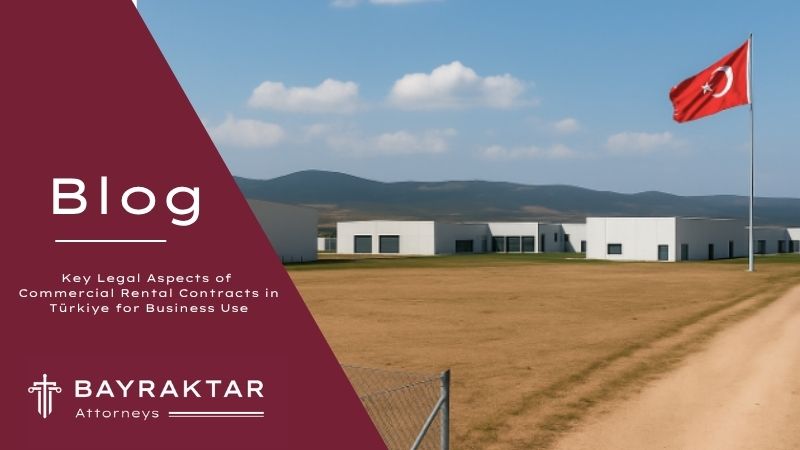
Commercial leasing is a vital element of doing business in Türkiye, especially for foreign companies aiming to rent factories, warehouses, and office buildings.
Unlike residential leases, commercial leases in Türkiye involve greater negotiation freedom and come with complex legal obligations that every business tenant must understand.
Legal Framework for Commercial Lease Contracts
Commercial lease agreements in Türkiye are regulated primarily under the Turkish Code of Obligations No. 6098. While general principles apply to all rental agreements, businesses benefit from more contractual flexibility, particularly in determining lease durations, rent increases, and termination clauses.
Importance of Contractual Freedom in Business Leases
In commercial rentals, parties are largely free to agree on matters such as:
Length of the rental period
Rent adjustment formulas (indexed to USD, EUR, or inflation)
Repair and maintenance responsibilities
Conditions for subletting or transferring the lease
This flexibility is especially useful for manufacturing companies that need to secure long-term control over larger industrial sites.
Subleasing and Transfer of Lease Rights
While subleasing and transfer of lease rights are allowed, the explicit written consent of the landlord is usually required. Business tenants should:
Include subletting permissions directly in the lease agreement
Ensure that lease transfer rights are secured to allow future operational flexibility
Consider whether a change of control clause (in case the company is sold or merged) affects tenancy rights
Legal Consequences of Tenant Bankruptcy
If a tenant company declares bankruptcy, the commercial lease does not automatically terminate. However, the landlord may:
Request termination of the contract due to the tenant’s loss of ability to fulfill obligations
Apply to the bankruptcy estate for unpaid rent and damages
Reclaim the premises based on court approval
Tenants should consider securing a bank letter of guarantee or personal surety to prevent early termination due to insolvency proceedings.
Deposits, Guarantees, and Liability
Unlike residential leases, commercial leases often involve:
Higher deposit amounts—commonly equivalent to 6–12 months’ rent
Corporate guarantees or personal sureties
Clauses limiting liability in cases of force majeure or government seizure
It’s essential to negotiate these clauses carefully, especially in factory and warehouse rentals where infrastructure value is high.
Tax and Regulatory Considerations
Foreign businesses renting property in Türkiye should be aware of:
Stamp tax liability (typically 0.948% of total contract value unless exempt)
Mandatory notarization for some lease agreements, especially for large commercial properties
Registration with the land registry when the lease exceeds 10 years or when priority rights are granted
Dispute Resolution and Enforcement
Most commercial leases include clauses on dispute resolution. You can choose:
Turkish courts with jurisdiction based on the property's location
Arbitration, including Istanbul Arbitration Center (ISTAC) for faster dispute resolution
Mediation, which is mandatory before initiating lawsuits on rental disputes
Having an English-Turkish bilingual contract helps mitigate disputes and protects foreign investors in Türkiye.
Also Read; Key legal issues of commercial rentals
Our Legal Services for Commercial Tenants
At Bayraktar Attorneys, we provide tailored legal assistance to foreign companies, including:
Drafting and negotiating commercial lease agreements
Performing legal due diligence on properties and landlords
Structuring sublease and transfer rights
Advising on bankruptcy exposure and contract termination risks
Managing disputes through mediation, court, or arbitration
Final Thoughts
Renting commercial real estate in Türkiye offers businesses tremendous growth potential, especially in logistics, manufacturing, and industrial sectors.
However, without proper legal safeguards, a poorly structured lease can become a significant liability.
That’s why expert legal guidance is essential for securing long-term, strategic, and legally sound rental agreements in Türkiye.
Recently Added Blogs



.png)
.png)
.png)
.png)
